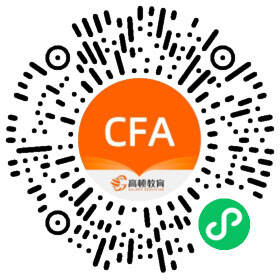



1、凡本网站注明“来源高顿教育”或“来源高顿网校”或“来源高顿”,的所有作品,均为本网站合法拥有版权的作品,未经本网站授权,任何媒体、网站、个人不得转载、链接、转帖或以其他方式使用。
2、经本网站合法授权的,应在授权范围内使用,且使用时必须注明“来源高顿网校”或“来源高顿”,并不得对作品中出现的“高顿”字样进行删减、替换等。违反上述声明者,本网站将依法追究其法律责任。
3、本网站的部分资料转载自互联网,均尽力标明作者和出处。本网站转载的目的在于传递更多信息,并不意味着赞同其观点或证实其描述,本网站不对其真实性负责。
4、如您认为本网站刊载作品涉及版权等问题,请与本网站联系(邮箱fawu@gaodun.com,电话:021-31587497),本网站核实确认后会尽快予以处理。
2023年CFA二级考试时间已公布,具体怎么样的一个情况呢,今天学姐就来带领大家一起来看看究竟怎么一回事儿吧~...
2023-10-072024年cfa三级备考时间规划应当如何分配,考试注意事项有哪些?最近有小伙伴咨询到学姐这个问题,今天学姐就来统一为大家进行解答,一起来看看吧~...
2023-08-302023年8月CFA一级考试什么时候公布,成绩如何查询?最近有小伙伴咨询到学姐这个问题,今天小编就俩好好跟大家进行解答,下面请跟随学姐一起来看看究...
2023-08-292024年CFA三级考试报名入口在哪里?最近有小伙伴咨询到小编关于CFA三级报名入口这件事儿,今天小编就来统一为大家进行解答,下面请跟随学姐一起来看看...
2023-08-21许多考完CFA二级考试的同学问CFA三级要怎么学?如何才能度过这个CFA三级。CFA三级和二级考试,它们的考试难度其实相差不大,基本不相伯仲,在经历过前...
2023-08-15对于CFA考生而言,建立知识体系是最重要的,万丈高楼平地起,打好基础对于CFA后续考试有着重要帮助。今天小编就给大家介绍关于CFA三级考试备考方法。...
2023-08-11首先,恭喜各位小伙伴已经达到了CFA考试的第三级。写下这篇文章也是因为希望助更多还在三级关口徘徊的同伴们能够少走些弯路,尽早出师。相信大家对...
2023-08-04老师 为什么第二题不做处理呢 不应该计入资本公积—股本溢价吗
老师好,这道题的会计分录应该是这样的吧,但是我不理解其他综合收益2000那个步骤,他不是以摊余成本计量的金融资产已确认损失2000万吗?不应该是信用减值损失的科目吗?为什么写其他综合收益这个科目在这里?
老师您好,固定资产清理,卖掉时候,转银行存款和资产处置损益,差别在哪里呢。我觉得卖掉固定资产,转哪个都差不多啊,谢谢老师。
选项c,资本公积—股本溢价4500为什么不选?
收回前期已核销的坏账,坏账准备记录在贷方怎么理解
老师 为什么第二题不做处理呢 不应该计入资本公积—股本溢价吗
老师好,这道题的会计分录应该是这样的吧,但是我不理解其他综合收益2000那个步骤,他不是以摊余成本计量的金融资产已确认损失2000万吗?不应该是信用减值损失的科目吗?为什么写其他综合收益这个科目在这里?
老师您好,固定资产清理,卖掉时候,转银行存款和资产处置损益,差别在哪里呢。我觉得卖掉固定资产,转哪个都差不多啊,谢谢老师。
选项c,资本公积—股本溢价4500为什么不选?
收回前期已核销的坏账,坏账准备记录在贷方怎么理解
10月25日高顿要迎来新一批CFA准持证人啦,欢迎CFA准持证人们来分享快乐!通过微博、小红书平台分享CFA三级PASS协会邮件截图,分享自己的考试经验、高顿课程质量讲师风格等,需要带话题#高顿CFA持证,高顿为每位准持证人(everybody)准备了纪念品,还会根据点赞量排名赢取礼品。...
2023-10-262023年CFA二级考试时间已公布,具体怎么样的一个情况呢,今天学姐就来带领大家一起来看看究竟怎么一回事儿吧~...
2023-10-07CFA是国际特许金融分析师证书,不仅在国内有用,在国际上都是通用的。今天学姐就来好好跟大家聊聊关于CFA适合哪些人去考这件事儿,一起来看看吧~...
2023-07-21cfa三级考试内容有哪些?考试一共多长时间?最近有同学咨询到小编这个问题,今天学姐就来统一回复一下大家啊,下面请跟随candy学姐一起来看看吧~...
2023-07-2124年佛山CFA三级考试时间已经公布了,各位准备报考佛山24年CFA三级的小伙伴速度来看,今天学姐就来带领大家一起来了解一下。...
2023-07-20CFA作为金融领域一本含金量极高的国际证书,完成CFA考试并拥有CFA证书意味着你拥有一项强有力的认证。通过CFA考试或相应级别考试,都有着极大地帮助与价值。CFA三级考试全部采用机考模式,从通过率来看,CFA通过率有所提高,具体什么情况呢,下面请跟随candy学姐一起来看看吧~...
2023-07-20金融分析师三级交税费,每一个级别都需要缴纳金融分析师考试税费。那么金融分析师三级交注册费吗?今天学姐就来好好跟大家聊聊这个话题,一起来看看吧~...
2023-07-1924年CFA三级考试时间已经公布了,各位准备报考24年CFA三级的小伙伴速度来看,今天小编就带大家了解一下,一起来看看吧~...
2023-07-18cfa三级题目有哪些类型?重点是什么?CFA协会已经公布了2023年8月CFA三级题型,具体什么情况呢,下面请跟随candy学姐一起来看看吧~...
2023-07-17CFA(Chartered Financial Analyst)是全球金融行业最权威的专业资格认证之一。许多人都在追求这个证书,但是这个考试的难度和竞争也让许多人望而却步。今天小编就来好好跟大家聊聊关于CFA三级考试的那些事儿,一起来看看吧~...
2023-07-14近段时间,小编看到好多名企的招聘启事中提到持有CFA证书优先之类的内容,看来对于CFA人才现在还是比较稀缺的,今天小编就来跟大家聊聊关于互联网金融专业CFA主要能学习到哪些东西,一起来看看吧~...
2023-07-13CFA考试就像过独木桥一样,没到头得时候绝对不能放松。因此就算之前考过了一、二级的也不能松懈,因为CFA考试的难度是递增的,越到后面难度就越大,所需要做的复习准备就越关键。今天小编就来好好跟大家聊聊CFA三级如何复习这件事儿,一起来看看吧~...
2023-07-13